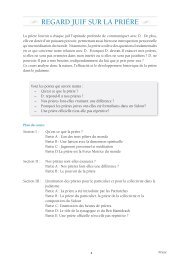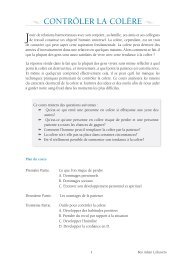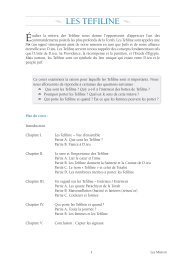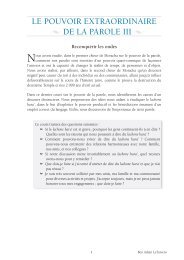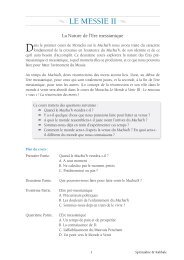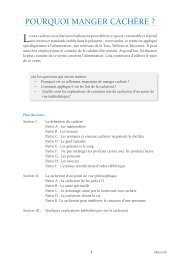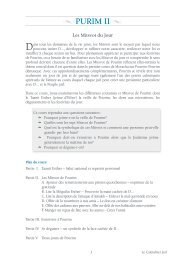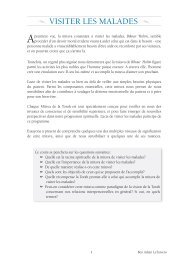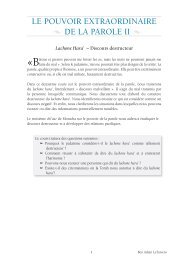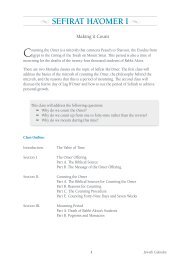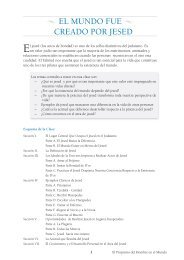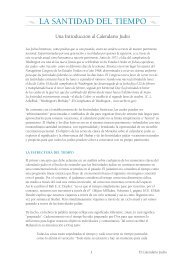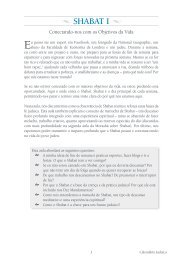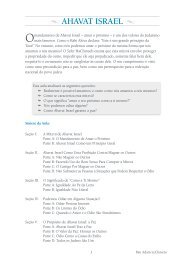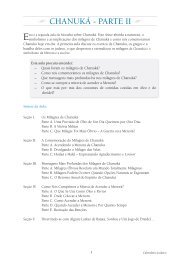Teshuvah – ParT I - Morasha Syllabus
Teshuvah – ParT I - Morasha Syllabus
Teshuvah – ParT I - Morasha Syllabus
You also want an ePaper? Increase the reach of your titles
YUMPU automatically turns print PDFs into web optimized ePapers that Google loves.
<strong>Teshuvah</strong> I<br />
We have said that teshuvah means returning to God <strong>–</strong> or, in the words of Rambam (Hilchot <strong>Teshuvah</strong> 7:6),<br />
to the Divine Presence. Yet, teshuvah also means returning to one’s true self, an inner purity that is always<br />
connected to its Divine source.<br />
7. Siddur, Morning Prayer; Rabbi Mordechai Becher, Gateway to Judaism, p. 136 <strong>–</strong> teshuvah is a<br />
return to the purity of one’s soul.<br />
Core Beliefs 4<br />
... יב התחפנ התא ,התרצי התא ,התארב התא ,איה הרוהט יב תתנש המשנ יקולא<br />
My God, the soul you have given me is pure. You created it, You formed it, You breathed it into me …<br />
<strong>Teshuvah</strong>, literally translated means “return.” We believe that the soul is intrinsically pure and began<br />
its sojourn in this world in a state of purity. Mistakes and wrongdoings are departures from the<br />
essential nature of the human soul. Therefore when a person has done something wrong, the process<br />
of teshuvah is really that of going back to his or her true essence.<br />
<strong>Teshuvah</strong> is so vital to mankind, it was created along with the Torah before the world.<br />
8. talmud Bavli, Pesachim 54a <strong>–</strong> teshuvah was created before the world.<br />
Seven things were created before the world. They<br />
are: the Torah, teshuvah …<br />
ןה ולאו םלועה ארבנש םדוק וארבנ םירבד העבש<br />
... הבושתו הרות<br />
The fact that teshuvah was created before the world itself implies that a person can do teshuvah even without<br />
having sinned. The world was created “at a distance” from God, and repentance draws it close. Repentance,<br />
in this sense, defines the most fundamental desire of God for the world. Fittingly, it is the only thing that the<br />
central blessings of the Shemoneh Esrei prayer describe as God’s desire.<br />
9. the Shemoneh esrei prayer <strong>–</strong> Of all the blessings, which include such concepts as wisdom,<br />
redemption, health, sustenance, etc., only repentance is expressed as God’s “desire.”<br />
Blessed are You, God, Who desires repentance. .הבושתב הצורה ’ה התא ךורב<br />
The theme of teshuvah is that of relationships. The relationship between God and Israel is compared to the<br />
relationship between husband and wife (see Shir HaShirim 1:1, with Rashi). Having strayed afar, teshuvah is<br />
the means by which we can draw close once again <strong>–</strong> close to God, and close to our inner selves.<br />
Because of Judaism’s profound understanding of relationships, there is no room for the idea of a confession box<br />
or of a third party affecting atonement. If we wrong a person, we must approach that individual himself. If we<br />
wrong God, it is up to us to approach Him. Only we can take responsibility to restore our original closeness to<br />
God by removing these barriers. Therefore, there is no room in Judaism for “third-party atonement.”<br />
KeY tHeMeS OF SeCtiOn i:<br />
H the word teshuvah means return. it’s a process of returning to God and to the deep essence of<br />
one’s pure soul.<br />
H <strong>Teshuvah</strong> involves a personal revolution. A person’s condition is defined by his relationship with<br />
God. He can be in the dark (in a spiritual sense <strong>–</strong> sullied with sin), or in the light, sparkling clean.<br />
the gift of teshuvah is the ability to orchestrate a personal revolution.



